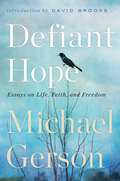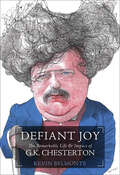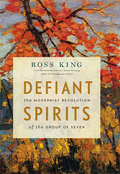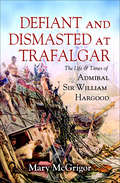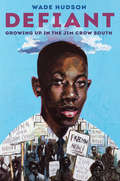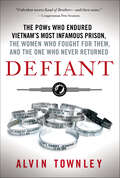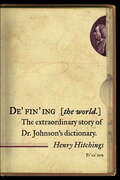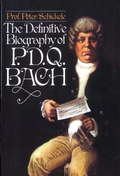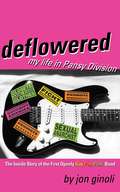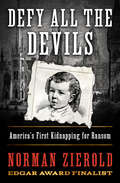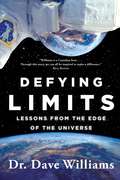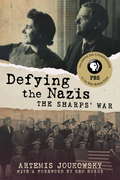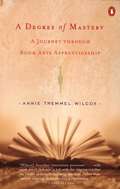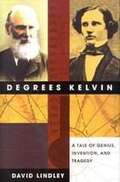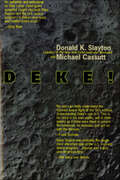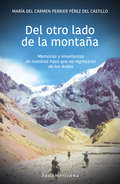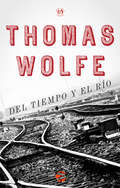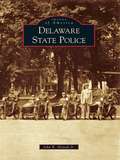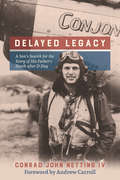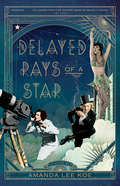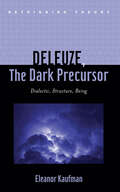- Table View
- List View
Defiant Hope: Essays on Life, Faith, and Freedom
by Michael GersonThe best writings from George W. Bush&’s speechwriter Michael Gerson, a pioneer of the compassionate conservative movement, a champion of Christian engagement, and an eloquent defender of the poor and the marginalized.It is not an exaggeration to say that Michael Gerson possessed one of the most important consciences of his generation. As the chief speech writer for George W. Bush, he wrote the words that rallied and ennobled the nation after September 11th. He helped design and champion Bush&’s PEPFAR program, which saved upwards of 20 million lives as HIV ravaged Africa. His famous line defending public education was to say that failure would amount to &“a soft bigotry of low expectations.&” He became one of the nation&’s most eloquent columnists, who was never content to do political horse race punditry but devoted himself to the most essential causes of the time, pushing back on the authoritarianism of Donald Trump and pushing for the kind of compassionate conservatism that he dedicated his life to designing. Defiant Hope is his writings about the things he loved—humanity, God, his dog, and his boys. Essays feature the immensely complicated sadness when you drop your children off at college for the first time. Another is about his public battle of depression. He also includes chapters about men and women who formed this great procession of Christian Reformers—John Wesley, Jonathan Edwards, William Wilberforce, and Olaudah Equiano—and the great causes to which they were devoted, from abolitionism to civil rights.What lingers is his gracious voice across all the roles that he played, as David Brooks writes in the introduction. What you hear is &“a prophet lamenting iniquity, a father and a friend capable of great bursts of gratitude and appreciation, a Christian who is sometimes buried under sadness and close to despair, but who never loses sight of that distant illuminating beacon of hope.&”
Defiant Joy: The Remarkable Life & Impact of G. K. Chesterton
by Kevin BelmonteYou may be aware that G. K. Chesterton authored influential Christian biographies and apologetics. But you may not know the larger-than-life Gilbert Keith Chesterton himself—not yet. Equally versed in poetry, novels, literary criticism, and journalism, he addressed politics, culture, and religion with a towering intellect and a soaring wit. Chesterton engaged his world through the written word. He carried on lively, public discussions with the social commentators of his day, continually challenging them with civility, humility, erudition, and his ever-sharp sense of humor. Today’s reader can find the same treasures, for as Chesterton said, “What a man can believe depends upon his philosophy, not upon the clock or the century.”In Kevin Belmonte’s fresh new biography, you’ll get to know the real G. K. Chesterton and his literary and cultured accomplishments. A giant of his time, Chesterton continues to live large in the imaginations of twenty-first-century readers.Endorsements:“Chesterton’s explanation of Christianity makes absolute sense of the world. He reminds us that, free of our comforting delusions, reality is a tragic adventure in which we get to participate.” —DONALD MILLER, author of the New York Times bestsellers A Million Miles in a Thousand Years and Blue Like Jazz“Bravo to Kevin Belmonte for turning his caring attention to the incomparably hilarious and brilliant genius that is G.K. Chesterton!” —ERIC METAXAS, New York Times best-selling author of Bonhoeffer: Pastor, Martyr, Prophet, Spy and Amazing Grace: William Wilberforce and the Heroic Campaign to End Slavery“There’s a great new biography about one of the Christian giants of the 20th Century. And I mean that literally. To read Kevin Belmonte's recent book Defiant Joy: The Remarkable Life & Impact of G. K. Chesterton, is to feel a powerful sense of longing . . . because there is such a longing, a great need for advocates like Chesterton in our day. . . . But let's be grateful we still have the works of that great man to study and learn from. . . And we also have for you have Belmonte's vibrant new biography -- a wonderful reminder of the magnificent example Chesterton has set for us.”—CHUCK COLSON(http://patriotpost.us/opinion/chuck-colson/2012/01/26/defiant-joy-why-we-still-need-chesterton/)
Defiant Spirits
by Ross KingBeginning in 1912, Defiant Spirits traces the artistic development of Tom Thomson and the future members of the Group of Seven, Franklin Carmichael, Lawren Harris, A. Y. Jackson, Franz Johnston, Arthur Lismer, J. E. H. MacDonald, and Frederick Varley, over a dozen years in Canadian history. Working in an eclectic and sometimes controversial blend of modernist styles, they produced what an English critic celebrated in the 1920s as the "most vital group of paintings" of the 20th century. Inspired by Cézanne, Van Gogh and other modernist artists, they tried to interpret the Ontario landscape in light of the strategies of the international avant-garde. Based after 1914 in the purpose-built Studio Building for Canadian Art, the young artists embarked on what Lawren Harris called "an all-engrossing adventure": travelling north into the anadian Shield and forging a style of painting appropriate to what they regarded as the unique features of Canada's northern landscape.Rigorously researched and drawn from archival documents and letters, Defiant Spirits constitutes a "group biography," reconstructing the men's aspirations, frustrations and achievements. It details not only the lives of Tom Thomson and the members of the Group of Seven but also the political and social history of Canada
Defiant and Dismasted at Trafalgar: The Life & Times of Admiral Sir William Hargood
by Mary McGrigorBorn in 1762, William Hargood's naval career spanned over 30 years, as he rose from humble midshipman to the captain of one of the most powerful warships of the day at Trafalgar. He campaigned all over the known world: the Americas, West Indies, throughout the Mediterranean. Britain was hardly ever at peace during those troubled times and men like Hargood sought out her enemies wherever they could find them. This is the age of gold bullion, pirates, plunder and grapeshot.During his career Hargood became a close friend of Admiral Lord Nelson and shared many an experience and triumph with him.Hargood's Belleisle was dismasted in the thick of action at Trafalgar but never sunk.
Defiant: Growing Up in the Jim Crow South
by Wade HudsonAs the fight for equal rights continues, Defiant takes a critical look at the strides and struggles of the past in this revelatory and moving memoir about a young Black man growing up in the South during the heart of the Civil Rights Movement. For fans of It's Trevor Noah: Born a Crime, Stamped, and Brown Girl Dreaming. <p><p> Born in 1946 in Mansfield, Louisiana, Wade Hudson came of age against the backdrop of the Civil Rights Movement. From their home on Mary Street, his close-knit family watched as the country grappled with desegregation, as the Klan targeted the Sixteenth Street Baptist Church in Birmingham, Alabama, and as systemic racism struck across the nation and in their hometown. <p><p> Amidst it all, Wade was growing up. Getting into scuffles, playing baseball, immersing himself in his church community, and starting to write. Most important, Wade learned how to find his voice and use it. From his family, his community, and his college classmates, Wade learned the importance of fighting for change by confronting the laws and customs that marginalized and demeaned people. <p><p> This powerful memoir reveals the struggles, joys, love, and ongoing resilience that it took to grow up Black in segregated America, and the lessons that carry over to our fight for a better future.
Defiant: The POWs Who Endured Vietnam's Most Infamous Prison, The Women Who Fought for Them, and The One Who Never Returned
by Alvin Townley50 years ago, the POWs who endured Vietnam's most famous prison came home. A powerful story of survival and triumph. Alvin Townley's Defiant will inspire anyone wondering how courage, faith, and brotherhood can endure even in the darkest of situations. “A riveting tribute to true American heroes.”—Senator John McCain, POW (1967-73)"Defiant is Unbroken meets Band of Brothers—and then some." —Congressman Pete SessionsDuring the Vietnam War, hundreds of American prisoners-of-war faced years of brutal conditions and horrific torture at the hands of North Vietnamese guards and interrogators who ruthlessly plied them for military intelligence and propaganda. Determined to maintain their Code of Conduct, the POWs developed a powerful underground resistance. To quash it, their captors singled out its eleven leaders, Vietnam's own "dirty dozen," and banished them to an isolated jail that would become known as Alcatraz. None would leave its solitary cells and interrogation rooms unscathed; one would never return.As these eleven men suffered in Hanoi, their wives at home launched an extraordinary campaign that would ultimately spark the nationwide POW/MIA movement. The members of these military families banded together and showed the courage not only to endure years of doubt about the fate of their husbands and fathers, but to bravely fight for their safe return. When the survivors of Alcatraz finally came home in 1973, one veteran would go on to receive the Medal of Honor, another would become a U.S. Senator, and a third served in the U.S. Congress.
Defining the World: The Extraordinary Story of Dr. Johnson's Dictionary
by Henry Hitchings&“[A] marvelous account&” of Johnson&’s towering achievement, nearly a decade of labor and linguistic fact-finding, presented by &“a buoyant, zestful writer&” (The Boston Globe). By the early eighteenth century, France and Italy had impressive lexicons, but there was no authoritative dictionary of English. Impelled by a mixture of national pride and commercial expedience, the prodigious polymath Samuel Johnson embraced the task, turning over the garret of his London home to the creation of his own giant dictionary. Johnson imagined that he could complete the job in three years. But the complexity of English meant that his estimate was wildly inadequate. Only after he had expended nearly a decade of his prime on the task did the dictionary finally appear—magisterial yet quirky, dogmatic but generous of spirit, and steeped in the richness of English literature. It would come to be seen as the most important British cultural monument of the eighteenth century, and its influence fanned out across Europe and throughout Britain&’s colonies—including, crucially, America. Brilliantly entertaining and enlightening, Defining the World is the story of Johnson&’s heroic endeavor. In alphabetically sequenced chapters, Henry Hitchings describes Johnson&’s adventure—his ambition and vision, his moments of despair, the mistakes he made along the way, and his ultimate triumph.
Definitely Hispanic: Growing Up Latino and Celebrating What Unites Us
by LeJuan JamesPerfect for fans of Fresh Off the Boat’s situational humor and Jane the Virgin’s celebration of Latinidad, Definitely Hispanic is a collection of introspective memoiristic essays by social media influencer and viral phenomenon LeJuan James about growing up Hispanic in the US.LeJuan James loves being Hispanic. But growing up in the United States to immigrant parents, he quickly noticed that their house rules and traditions didn’t always match up with his friends’. The result was a lifetime of laugh-out-loud relatable content for his videos. After half a decade of reenacting his experiences online, LeJuan is taking a closer look at everything he loves about his family’s culture. Definitely Hispanic is a collection of heartfelt memoiristic essays that explores the themes LeJuan touches upon in his videos and celebrates the values and traditions being kept alive by Hispanic parents raising US–born children. He shares anecdotes about discovering the differences between his and his friends’ households, demystifies “La Pela” (the Spanking), explains the vital role women play in Hispanic families, and pays reverence to universal cultural truths like food is love and music is in Hispanics’ DNA. From #Home, where he talks about how his family moved back and forth between the United States and Puerto Rico until settling in Orlando, FL, to #TheHouse, when he was finally able to buy his parents the home they deserve thanks to his online success; this wide-ranging collection of essays will resonate with fans of all ages who feel like they straddle the line between two (or more) cultures, languages, and/or identities.
Definitive Biography of P.D.Q. Bach
by Peter SchickeleWhat little-known son of a famous genius has been called:"A musical blight""A one-man plague""History's most justifiably neglected composer""The worst musician ever to trod organ pedals" "A pimple on the face of music"In this long-awaited hoax, possibly the most unimportant piece of scholarship in over two thousand years, Professor Peter Schickele has finally succeeded in ripping the veil of obscurity from the most unusual -- to put it kindly -- composer in the history of music: P.D.Q. Bach, the last and unquestionably the least of the great Johann Sebastian Bach's many children.From the Trade Paperback edition.
Deflowered: My Life in Pansy Division
by Jon Ginoli"We're the buttfuckers of rock-and-roll, We want to sock it to your hole!" With these words written in a notebook, Jon Ginoli sets off on a journey of self-discovery and musical passion to become the founding member of Pansy Division, the first out and proud queercore punk rock band to hit the semi-big time. Set against the changing decades of music, we follow the band from their inception in San Francisco, to their search for a music label and a permanent drummer to their current status as indie rock icons. We see the highs-touring with Green Day-and the lows-homophobic fans-of striving for acceptance and success in the world of rock. Replete with the requisite tales of sex, drugs, groupies, band fights and label battles, this rollicking memoir is also an impassioned account of staying true to the artistic vision of queer rock'n'roll.
Deflowered: My Life in Pansy Division
by Jon Ginoli"We're the buttfuckers of rock-and-roll, We want to sock it to your hole!" With these words written in a notebook, Jon Ginoli sets off on a journey of self-discovery and musical passion to become the founding member of Pansy Division, the first out and proud queercore punk rock band to hit the semi-big time. Set against the changing decades of music, we follow the band from their inception in San Francisco, to their search for a music label and a permanent drummer to their current status as indie rock icons. We see the highs--touring with Green Day--and the lows--homophobic fans--of striving for acceptance and success in the world of rock. Replete with the requisite tales of sex, drugs, groupies, band fights and label battles, this rollicking memoir is also an impassioned account of staying true to the artistic vision of queer rock'n'roll.
Defy All the Devils: America's First Kidnapping for Ransom
by Norman ZieroldThe &“fascinating, hair-raising, suspenseful&” account of a little boy abducted in broad daylight and the desperate manhunt to find him (The New York Times Book Review). On July 1, 1874, four-year-old Charley Ross and his older brother, Walter, were playing in front of their stately Philadelphia home when a horse-drawn carriage pulled up with two men who offered candy and fireworks if the boys would ride with them. Hours later, Walter came back, stating that they had ridden through the city until the men abandoned him in the street but kept Charley. Soon after, their father, Christian K. Ross, received a demand for $20,000 in return for his son. Ross went to the police for help—and before long, the case became a national phenomenon. A popular song pleaded for the boy&’s safe return. The Philadelphia police searched every home in the city, and thousands of people falsely reported that they had seen Charley or knew his whereabouts. Meanwhile, the kidnappers&’ ransom letters were becoming more threatening and bizarre. The press, eager to fan the flames of hysteria, printed wholly fabricated stories and even accused Christian Ross of orchestrating the whole thing in order to hide the fact that Charley was illegitimate. And then the men who took Charley went silent . . . This is the chilling true story of a crime that transfixed a still-growing America, the unlikely series of events that produced the case&’s most tantalizing clues, and the tragic twist of fate that plunged the Ross family back into darkness and haunted them for decades to come. Originally published as Little Charley Ross.
Defying Limits: Lessons from the Edge of the Universe
by Dave WilliamsAn inspirational, uplifting, and life-affirming memoir about passion, resilience and living life to the fullest, from Dr. Dave Williams, one of Canada’s most accomplished astronauts.I had dreamt about becoming an astronaut from the time I watched Alan Shepard launch on the first American sub-orbital flight on May 5, 1961. Eleven days before my seventh birthday, I committed to a new goal: one day, I would fly in outer space. Dr. Dave has led the sort of life that most people only dream of. He has set records for spacewalking. He has lived undersea for weeks at a time. He has saved lives as an emergency doctor, launched into the stratosphere twice, and performed surgery in zero gravity. But if you ask him how he became so accomplished, he’ll say: “I’m just a curious kid from Saskatchewan.” Curious indeed. Dr. Dave never lost his desire to explore nor his fascination with the world. Whether he was exploring the woods behind his childhood home or floating in space at the end of the Canadarm, Dave tried to see every moment of his life as filled with beauty and meaning. He learned to scuba dive at only twelve years old, became a doctor despite academic struggles as an undergraduate, and overcame stiff odds and fierce competition to join the ranks of the astronauts he had idolized as a child. There were setbacks and challenges along the way—the loss of friends in the Columbia disaster, a cancer diagnosis that nearly prevented him from returning to space—but through it all, Dave never lost sight of his goal. And when he finally had the chance to fly among the stars, he came to realize that although the destination can be spectacular, it’s the journey that truly matters. In Defying Limits, Dave shares the events that have defined his life, showing us that whether we’re gravity-defying astronauts or earth-bound terrestrials, we can all live an infinite, fulfilled life by relishing the value and importance of each moment. The greatest fear that we all face is not the fear of dying, but the fear of never having lived. Each of us is greater than we believe. And, together, we can exceed our limits to soar farther and higher than we ever imagined.
Defying the Nazis: The Sharps' War
by Ken Burns Artemis JoukowskyOfficial companion to the Ken Burns film premiering September 20, 2016, on PBS tells the little-known story of the Sharps, an otherwise ordinary couple whose faith and commitment to social justice inspired them to undertake dangerous rescue and relief missions across war-torn Europe, saving the lives of countless refugees, political dissidents, and Jews on the eve of World War II.In 1939, the Reverend Waitstill Sharp, a young Unitarian minister, and his wife, Martha, a social worker, accepted a mission from the American Unitarian Association: they were to leave their home and young children in Wellesley, Massachusetts, and travel to Prague, Czechoslovakia, to help address the mounting refugee crisis. Seventeen ministers had been asked to undertake this mission and had declined; Rev. Sharp was the first to accept the call for volunteers in Europe.Armed with only $40,000, Waitstill and Martha quickly learned the art of spy craft and undertook dangerous rescue and relief missions across war-torn Europe, saving refugees, political dissidents, and Jews on the eve of World War II. After narrowly avoiding the Gestapo themselves, the Sharps returned to Europe in 1940 as representatives of the newly formed Unitarian Service Committee and continued their relief efforts in Vichy France.A fascinating portrait of resistance as told through the story of one courageous couple, Defying the Nazis offers a rare glimpse at high-stakes international relief efforts during WWII and tells the remarkable true story of a couple whose faith and commitment to social justice inspired them to risk their lives to save countless others.A companion documentary film was directed by Ken Burns and Artemis Joukowsky.
Degas, Painter of Ballerinas
by Susan Goldman RubinThrough Edgar Degas’s beloved paintings, drawings, and sculptures, Susan Goldman Rubin conveys the wonder and excitement of the ballet world. Degas is one of the most celebrated painters of the impressionist movement, and his ballerina paintings are among the most favorite of his fans. In his artwork, Degas captures every moment, from the relentless hours of practice to the glamour of appearing on stage, revealing a dancer’s journey from novice to prima ballerina. Observing young students, Degas drew their poses again and again, determined to achieve perfection. The book includes a brief biography of his entire life, endnotes, bibliography, where to see his paintings, and an index.
Degree Of Mastery: A Journey through Book Arts Apprenticeship
by Annie Tremmel Wilcox<P>FOR BIBLIOPHILES OF ALL STRIPES, AN AFFECTIONATE PAEAN TO THE ART OF BOOKMAKING, AND A POIGNANT TRIBUTE TO A LASTING FRIENDSHIP <P>In this extraordinary memoir, certain to captivate anyone who's ever appreciated the feel of a good book, Annie Tremmel Wilcox deftly explores the artistry, traditions, and precise techniques of bookmaking and book restoration. Using excerpts from her diaries, newspaper articles, exhibit notices, and correspondence, she passionately recounts her experiences learning the art of making and preserving books as the first female apprentice to renowned bookbinder and conservator William Anthony. <P>At once rendering a gorgeous, moving scrapbook of her tutelage under this extraordinary craftsman and expertly demystifying the fascinating technical processes of this centuries-old art form, A Degree of Mastery is a singular achievement certain to enchant book lovers and craftspeople alike.
Degrees Kelvin: A Tale Of Genius, Invention, And Tragedy
by David LindleyLORD KELVIN. In 1840, a precocious 16-year-old by the name of William Thomson spent his summer vacation studying an extraordinarily sophisticated mathematical controversy. His brilliant analysis inspired lavish praise and made the boy an instant intellectual celebrity. <P> As a young scholar William dazzled a Victorian society enthralled with the seductive authority and powerful beauty of scientific discovery. At a time when no one really understood heat, light, electricity, or magnetism, Thomson found key connections between them, laying the groundwork for two of the cornerstones of 19th century science -- the theories of electromagnetism and thermodynamics. Charismatic, confident, and boyishly handsome, Thomson was not a scientist who labored quietly in a lab, plying his trade in monkish isolation. When scores of able tinkerers were flummoxed by their inability to adapt overland telegraphic cables to underwater, intercontinental use, Thomson took to the high seas with new equipment that was to change the face of modern communications. And as the world's navies were transitioning from wooden to iron ships, they looked to Thomson to devise a compass that would hold true even when surrounded by steel. <P> Gaining fame and wealth through his inventive genius, Thomson was elevated to the peerage by Queen Victoria for his many achievements. He was the first scientist ever to be so honored. Indeed, his name survives in the designation of degrees Kelvin, the temperature scale that begins with absolute zero, the point at which atomic motion ceases and there is a complete absence of heat. <P> Sir William Thomson, Lord Kelvin, was Great Britain's unrivaled scientific hero. But as the century drew to a close and Queen Victoria's reign ended, this legendary scientific mind began to weaken. He grudgingly gave way to others with a keener, more modern vision. But the great physicist did not go quietly. With a ready pulpit at his disposal, he publicly proclaimed his doubts over the existence of atoms. He refused to believe that radioactivity involved the transmutation of elements. And believing that the origin of life was a matter beyond the expertise of science and better left to theologians, he vehemently opposed the doctrines of evolution, repeatedly railing against Charles Darwin. Sadly, this pioneer of modern science spent his waning years arguing that the Earth and the Sun could not be more than 100 million years old. And although his early mathematical prowess had transformed our understanding of the forces of nature, he would never truly accept the revolutionary changes he had helped bring about, and it was others who took his ideas to their logical conclusion. <P> In the end Thomson came to stand for all that was old and complacent in the world of 19th century science. Once a scientific force to be reckoned with, a leader to whom others eagerly looked for answers, his peers in the end left him behind -- and then meted out the ultimate punishment for not being able to keep step with them. For while they were content to bury him in Westminster Abbey alongside Isaac Newton, they used his death as an opportunity to write him out of the scientific record, effectively denying him his place in history. Kelvin's name soon faded from the headlines, his seminal ideas forgotten, his crucial contributions overshadowed. Destined to become the definitive biography of one of the most important figures in modern science, Degrees Kelvin unravels the mystery of a life composed of equal parts triumph and tragedy, hubris and humility, yielding a surprising and compelling portrait of a complex and enigmatic man.
Deke!: From Mercury To The Shuttle
by Michael Cassutt Donald K. SlaytonDeke Slayton was one of the first seven Mercury astronauts--and he might have been the first American in space. Instead, he became the first chief of American Astronaut Corps. It was Deke Slayton who selected the crews who flew the Gemini, Apollo, and Skylab missions. It was Deke Slayton who made Neil Armstrong the first man on the moon.Deke! is Deke Slayton's' story--told in his own words and in the voices of the men and women who worked with him and knew him best. Deke Slayton's knowledge of how the .S. manned space program worked is the missing piece of every space buff's puzzle. Now, after decades of silence, he tells his priceless stories of those years when American was engaged in the greatest voyage of exploration in human history.At the Publisher's request, this title is being sold without Digital Rights Management Software (DRM) applied.
Del otro lado de la montaña: Memorias y enseñanzas de nuestros hijos que no regresaron de los Andes
by María del Perrier Pérez del Castillo Claudia Pérez FerreiraLa historia de los jóvenes que no regresaron de la tragedia de los Andes en 1972. El viernes 13 de octubre de 1972, un avión con 45 uruguayos se estrellaba en la cordillera de los Andes. Setenta y dos días después, regresaban 16 sobrevivientes. Esta circunstancia significó un antes y un después para todos ellos, y también para las familias de quienes no regresaron. Este libro nos llevará a la intimidad de la vida de esas familias y los jóvenes que quedaron en la montaña, desde los años previos al accidente, el nacimiento de una hermandad y comunidad alrededor del equipo de rugby que organizó el viaje en octubre del 72, el día del accidente, la posterior búsqueda de sobrevivientes y el proceso de superación de las familias a través de la biblioteca Nuestros Hijos, fundada por las madres de muchos de esos jóvenes que no volvieron aquel día. Esta es una narración personal y vivida en la voz de Claudia, hermana de Marcelo Pérez del Castillo, capitán y principal promotor del viaje, que demuestra que la historia de esos jóvenes comienza mucho antes de aquel fatídico accidente. Es una historia de superación que deja un sinfín de enseñanzas ante las adversidades de la vida. En este trabajo único, por primera vez sabremos quiénes eran esos muchachos que no volvieron del accidente de primera mano de sus familiares. María del Carmen Perrier Pérez del Castillo construye la historia de estos jóvenes y familias que a través del valor y la fe nos siguen enseñando desde la Cordillera.
Del tiempo y el río
by Thomas Wolfe Maruja Gómez SegalésEugene se embarca en un viaje hacia el Norte. Después de haber dejado la universidad en su estado natal, está convencido de que se ha convertido en testigo y repositorio de una vasta y panorámica serie de imágenes que, en conjunto, revelan las innumerables caras de América.Con el avance del viaje, lo embarga una sensación de huida del misterio oscuro y lúgubre del Sur hacia la libertad y la promesa luminosa del Norte, con sus ciudades brillantes y sus esperanzas extravagantes. Las llanuras, los picos y los valles que conforman el paisaje sobre el que pasa, así como los innumerables pueblos y ciudades a lo largo del camino, nos hablan a través de Eugene de la diversidad ilimitada de los Estados Unidos.
Delancey: A Man, a Woman, a Restaurant, a Marriage
by Molly WizenbergIn this funny, frank, and tender new memoir, the author of the New York Times bestseller A Homemade Life and the blog Orangette recounts how opening a restaurant sparked the first crisis of her young marriage. When Molly Wizenberg married Brandon Pettit, he was a trained composer with a handful of offbeat interests: espresso machines, wooden boats, violin-building, and ice cream-making. So when Brandon decided to open a pizza restaurant, Molly was supportive--not because she wanted him to do it, but because the idea was so far-fetched that she didn't think he would. Before she knew it, he'd signed a lease on a space. The restaurant, Delancey, was going to be a reality, and all of Molly's assumptions about her marriage were about to change. Together they built Delancey: gutting and renovating the space on a cobbled-together budget, developing a menu, hiring staff, and passing inspections. Delancey became a success, and Molly tried to convince herself that she was happy in their new life until--in the heat and pressure of the restaurant kitchen--she realized that she hadn't been honest with herself or Brandon. With evocative photos by Molly and twenty new recipes for the kind of simple, delicious food that chefs eat at home, Delancey is a moving and honest account of two young people learning to give in and let go in order to grow together.
Delaware State Police (Images of America)
by John R. Alstadt Jr.April 28, 1923, marks the birth of the Delaware State Police. Discussions occurred as early as 1906 for a statewide police organization to cope with speeding automobiles, roving bands of troublemakers, and the ever-present bootleggers. Prohibition and the 18th Amendment brought the discussion to the forefront. With the hiring of Charles J. McGarigle and Joseph A. McVey, the Delaware Highway Police Department came to fruition on January 1, 1920. Using many never-before-published photographs from the Delaware State Police Museum archive, Images of America: Delaware State Police illustrates the storied past of the Delaware State Police from 1920 to 1985.
Delayed Legacy: A Son's Search for the Story of His Father's Death after D-Day
by Conrad John Netting IVThis book is part love story, part wartime thriller, part coming-of-age struggle, a compelling reminder that the human story is not over when a war ends.
Delayed Rays of a Star: A Novel
by Amanda Lee KoeNamed a most anticipated book of the summer by ELLE, USA Today, Thrillist, Kirkus, and LitHubA dazzling debut novel following the lives of three groundbreaking women--Marlene Dietrich, Anna May Wong, and Leni Riefenstahl--cinema legends who lit up the twentieth centuryAt a chance encounter at a Berlin soirée in 1928, the photographer Alfred Eisenstaedt captures three very different women together in one frame: up-and-coming German actress Marlene Dietrich, who would wend her way into Hollywood as one of its lasting icons; Anna May Wong, the world's first Chinese American star, playing for bit parts while dreaming of breaking away from her father's modest laundry; and Leni Riefenstahl, whose work as a director would first make her famous--then, infamous. From this curious point of intersection, Delayed Rays of a Star lets loose the trajectories of these women's lives. From Weimar Berlin to LA's Chinatown, from a seaside resort in East Germany to a luxury apartment on the Champs-Élysées, the different settings they inhabit are as richly textured as the roles they play: siren, muse, predator, or lover, each one a carefully calibrated performance. And in the orbit of each star live secondary players--a Chinese immigrant housemaid, a German soldier on leave from North Africa, a pompous Hollywood director--whose voices and viewpoints reveal the legacy each woman left in her own time, as well as in ours. Amanda Lee Koe's playful, wry prose guides the reader dexterously around murky questions of ego, persona, complicity, desire, and difference. Intimate and raw, Delayed Rays of a Star is a visceral depiction of womanhood--its particular hungers, its calculations, and its eventual betrayals--and announces a bold new literary voice.
Deleuze, The Dark Precursor: Dialectic, Structure, Being (Rethinking Theory)
by Eleanor KaufmanA thoughtful and original analysis of the writings of influential French philosopher Gilles Deleuze.Gilles Deleuze is considered one of the most important French philosophers of the twentieth century. Eleanor Kaufman situates Deleuze in relation to others of his generation, such as Jean-Paul Sartre, Pierre Klossowski, Maurice Blanchot, and Claude Lévi-Strauss, and she engages the provocative readings of Deleuze by Alain Badiou and Slavoj Žižek.Deleuze, The Dark Precursor is organized around three themes that critically overlap: dialectic, structure, and being. Kaufman argues that Deleuze's work is deeply concerned with these concepts, even when he advocates for the seemingly opposite notions of univocity, nonsense, and becoming. By drawing on scholastic thought and reading somewhat against the grain, Kaufman suggests that these often-maligned themes allow for a nuanced, even positive reflection on apparently negative states of being, such as extreme inertia. This attention to the negative or minor category has implications that extend beyond philosophy and into feminist theory, film, American studies, anthropology, and architecture.
